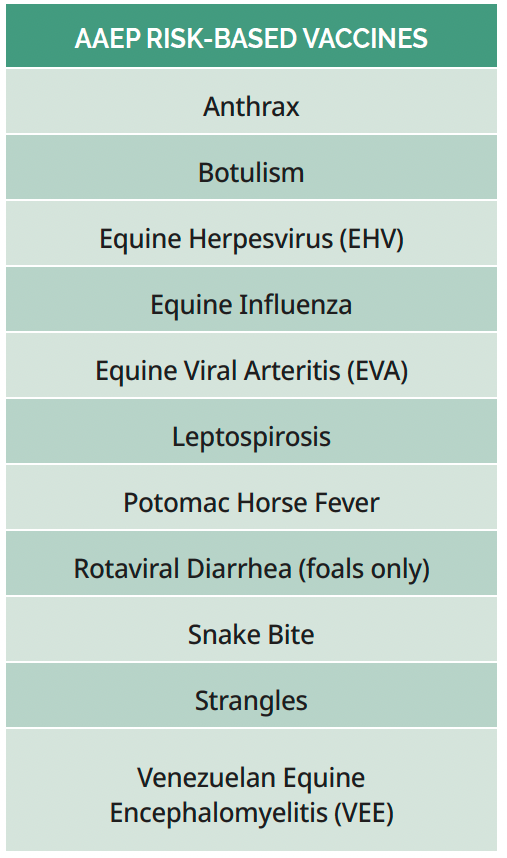Supporting Your Horse’s Immune System
What does it take to optimize the equine immune response and fight off disease?

Could your horse’s diet, workload, and environment undermine his immune system, leaving him vulnerable to infectious diseases, allergies, and delayed healing? Very much so, experts say. “Horses are susceptible to various stressors that can compromise immune function over time,” says Samuel White, PhD, associate professor and head of projects at York St. John University, in England. With expertise in applied immunology, White has studied culprits of equine immunosuppression. So far, excessive exercise, poor nutrition, chronic stress, and prolonged environmental exposure have made the list.
In this article White, along with an internal medicine specialist and an equine nutrition consultant, demonstrates the complex connection between a horse’s immune health, environment, and lifestyle.
Blank Slate: Equine Immunity at Birth
Unlike humans, who come into the world protected by antibodies acquired in utero, foals develop inside multilayered epitheliochorial placentas that only allow minimal maternal transfer of antibodies to the fetus. This lack of immunity transfer during pregnancy makes newborn foals’ immune systems naive (vulnerable) at birth.
“Equine neonates depend on their dams’ antibody-rich colostrum for early protection against infectious agents,” says Allen Page, DVM, PhD, assistant professor in the Department of Veterinary Science at the University of Kentucky’s Maxwell H. Gluck Equine Research Center, in Lexington. Fortunately, beyond the initial reliance on colostrum, this lack of immunity at birth doesn’t appear to put equids at a disadvantage later in life, and Page hasn’t come across any long-term effects from this early vulnerability.

Immunity Through Vaccination
Another key characteristic of the equine immune system is a shorter and less robust immune response to vaccines compared to humans, says Jeremy Frederick, DVM, Dipl. ACVIM, owner of Advanced Equine of the Hudson Valley, an ambulatory equine veterinary practice based in Wappingers, New York. These factors explain why horses need annual or biannual boosters, whereas people can maintain adequate immunity against a particular disease for a decade or more post-vaccination. “Horses generally have lower levels of memory cells that produce long-lasting … lymphocytes (white blood cells that produce antibodies to fight infection), which means immunity from vaccines wanes faster, necessitating more frequent boosters,” Frederick says. “This is particularly true for respiratory viruses (influenza and equine herpesvirus, aka EHV) and mosquito-borne encephalitis viruses (mainly EEE and WEE).”

He also explains that horses encounter more infectious agents than humans, particularly those from other animals, insects, and the environment. This contributes to their need for more frequent vaccinations. “This effect is compounded when horses regularly travel to events, shows, or new environments where they interact with unfamiliar animals and environments,” Frederick adds.
So, how can you maximize the protective effects of your horse’s vaccines? “Firstly, cover your bases by working with your veterinarian to ensure your animals are on a proper vaccination schedule,” Frederick says. The American Association of Equine Practitioners (AAEP) provides a list of core vaccinations that every U.S.-based horse should receive at least annually and additional risk-based vaccines depending on exposure risk.
Some horse owners have their veterinarians draw blood to check antibody titers before (or instead of, depending on results) administering annual boosters. “However, since this is an added expense and there are no established protective levels for most diseases, few clients choose to check titers regularly,” Frederick says. “Therefore, annual or biannual vaccinations are recommended for most horses
This story requires a subscription to The Horse magazine.
Current magazine subscribers can click here to and continue reading.
Subscribe now and gain unlimited access to premium content.
Subscribe NowWe at The Horse work to provide you with the latest and most reliable news and information on equine health, care, management, and welfare through our magazine and TheHorse.com. Our explanatory journalism provides an understandable resource on important and sometimes complex health issues. Your subscription will help The Horse continue to offer this vital resource to horse owners of all breeds, disciplines, and experience levels.

Related Articles
Stay on top of the most recent Horse Health news with


















